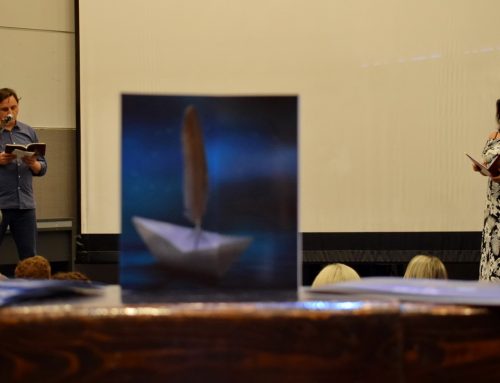Noted Japanese poet Makoto Ōoka, the winner of the “Golden Wreath” award of the Struga Poetry Evenings of 1996, passed-away on Wednesday, April 5th.
Makoto Ōoka (born Feb. 16, 1931, Mishima City, Japan) was prolific Japanese poet and literary critic who was largely responsible for bringing contemporary Japanese poetry to the attention of the Western world.
The son of a tanka poet, Ōoka graduated from the University of Tokyo in 1953 with a degree in literature and subsequently worked as a newspaper reporter and college professor. A book of verse, Kioku to genzai (1956; “Memory and the Present”), established his reputation as a poet. He was especially noted for his criticism, however, including the essays collected in the volume Nihon shiika kikō (1978; “Travels Through Japanese Poetry”).
Deeply immersed in classic Japanese poetry and its aesthetics, a practitioner of tanka from his youth, and influenced by French symbolism and French poetry, Ooka weaves Japanese classical sensibilities and nuances into his modern poetry, resulting in a style at once sensuous and intellectual.
Makoto Ooka, who is involved in broad ranging literary activities in the field of “words” as a poet and a critic, and who possesses deep analytic powers as a historian, has made an enormous contribution both at home and abroad toward dissemination of the charm of the Japanese language. In the 1970s Ōoka began experimenting with linked verse (renga), in which several poets contribute verses to a single poem. He extended his renga experiments to poets in the West as well, and during the 1980s collaborations by German, French, and American poets were published in a number of anthologies. He has revived the traditional group production method of renga and renku, which was one of the basic principles of poetic creation in ancient Japan, in the context of contemporary poetry. He calls his experiment renshi (linked verse), and he has attracted the attention of overseas scholars of contemporary Japanese studies and poets by this unique experiments. Poets from all parts of Europe and America participate, under his guidance, in his renshi activities, creating poetry through interpreters. It appears that renshi has established itself in all the countries of the world today. His unstinting efforts toward the development of linked-verse (renshi) exchange with the poets and literati of the world, the first experiment of its kind ever carried out, have served to carve out new horizons for cultural exchange and international exchange in the field of literature, as a result of which he has gained great renown as a “cultural emissary” of Japanese culture and literature.
Translations of Ōoka’s poetry were collected and published in English in the volumes A String Around Autumn (1982) and Elegy and Benediction (1991). The Colors of Poetry: Essays in Classic Japanese Verse (1991) contains eight essays by Ōoka on Japanese poetry. The English translation A Poet’s Anthology was published in 1993.
Besides being a prolific poet and literary ciritic, Makoto Ōoka was also the Director of the Japan Artists Association, from 1974, the Chairman of the Japan Contemporary Poets Society in the period of 1979-81, a professor at the Tokyo National University of Fine Arts and Music from 1988 -94. He was also the Chairman of the Japan PEN Club (1989-94) and a Member of the Japan Arts Academy.
He has received numerous awards for his numerous books of poetry, criticism, literary history, and literary theories in Japan and abroad, including the Golden Wreath of the Struga Poetry Evenings, Macedonia in 1996. He was awarded with many other recognitions, including the Cultural Prize of the Municipality of Tokyo in 1993, Officier de l’Ordre des Arts et des Lettres (France) in 1993, Japan Academy of the Arts Prize for poetry and criticism in 1995, Asahi Prize in 1996, and Cultural Merit Award in 1997, L’ordre national de la legion d’honneur from France in 2004.
Major Publications
He is the author of the books: The Memory and the Presence (1956), Her Fragnant Flesh (1971), Scetch in Perspective Dedicated to Summer (1972), To a Girl in Springtime (1978), Capital of Water (1981), Message of the Water to its Homeland (1989) and others. In 1978 in Tokio his collected works in 15 voulmes were released.
He is also the author of:
The Colors of Poetry: Essays on Classic Japanese Verse (Sante Fe: Katydid Books, 1991. Co-authors: Thomas Fitzsimmons, Donald Keene, Takako Lento, Thomas Lento).
A Poet’s Anthology: The Range of Japanese Poetry (Sante Fe: Katydid Books, 1994. Translated into English by Janine Beichman).
What the Kite Thinks: A Linked Poem by Makoto Ooka, Wing Tek Lum, Joseph Stanton, and Jean Yamasaki Toyama (Manoa: University of Hawaii Press, 1994).
The Poetry and Poetics of Ancient Japan (Santa Fe: Katydid Books, 1997. Translated into English by Thomas Fitzsimmons).
Dans l’océan du silence (Paris: Voix d’encre, 1998. Translated into French by Dominique Palmé).
Oriori no Uta: Poems for all seasons (Tokyo: Kodansha International, 2000. Translated into English by Janine Beichman).









